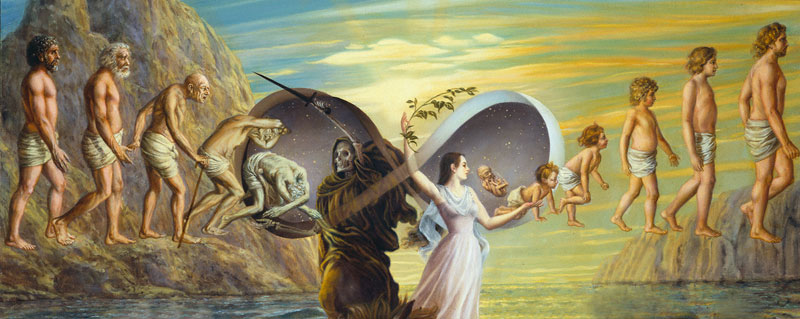
Question: Can the time of death be changed by our karma? Or has it been kind of set up since we were born, and when it’s time it’s time?
Answer:
The time, place and circumstances of our birth, its major events and the duration of our life are predetermined according to our past karma. We are allotted a certain number of breaths and our conception and birth occur at a time when the stars are in a certain position so that astrological influences will determine the events of our life. This cannot be changed by karma. You cannot cancel out bad karma, for instance, by doing good things. You will get your bad karma for doing bad things and your good karma for doing good things. Both will force you to return to the material world.

You get what you desire if you deserve it – according to your karma – and you get what you deserve whether you desire it or not. Positive thinkers and creative visualizers may think that they can control their destiny by being positive, but everyone who buys a lottery ticket imagines what they’ll do when they win [visualization], but the vast majority never win because it is not their karma to be rich.

Srila Bhaktivedanta Swami explains how our destiny is determined by our karma:
There are different kinds of welfare activities in this material world, but the supreme welfare activity is the spreading of Krishna consciousness [love of God]. Other welfare activities cannot be effective, for the laws of nature and the results of karma cannot be checked. It is by destiny, or the laws of karma, that one must suffer or enjoy. For instance, if one is given a court order, he must accept it, whether it brings suffering or profit. Similarly, everyone is under obligations to karma and its reactions. No one can change this.
[Purport Srimad Bhagavatam 8:7:44]
… A man in perfect knowledge knows that one cannot be happier than he is destined to be. In this material world, everyone is destined to suffer a certain amount of distress and enjoy a certain amount of happiness. The amount of happiness and distress is already predestined for every living entity. No one can increase or decrease the happiness of the materialistic way of life. The brahmana, therefore, did not exert himself for more material happiness; instead, he used his time for advancement of Krishna consciousness. …
[Krsna Book: “Meeting of Lord Krishna with Sudama Brahmana”]
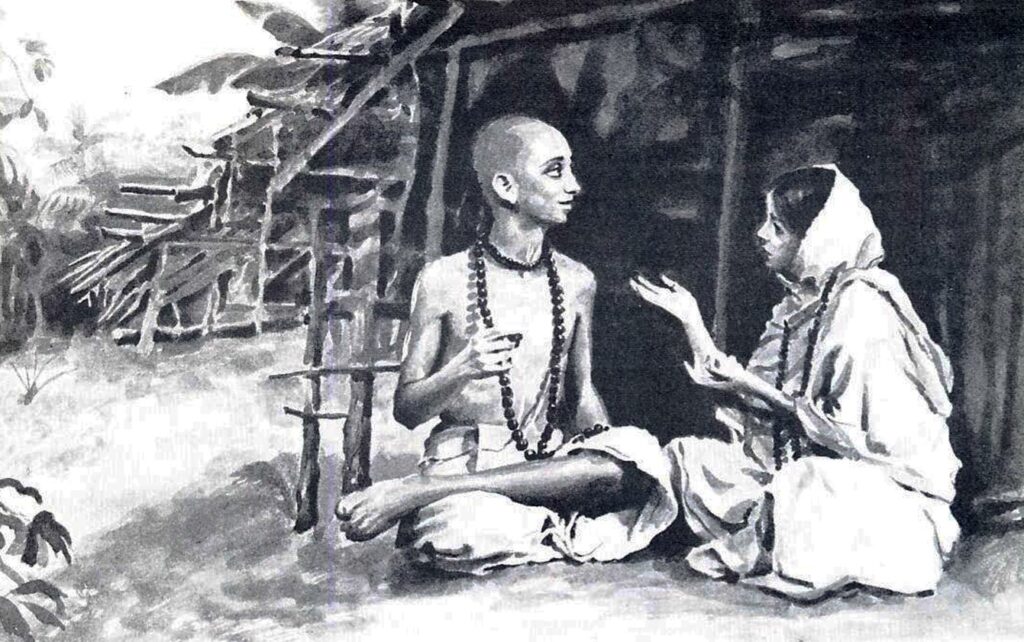
The Question of Evil
The scholars of the Old Testament paint a picture of a vengeful God. Their teaching is that God punishes a race or nation for their disobedience to Him. Whenever the Jews were defeated or dominated by other nations – the Babylonians, Greeks and Romans etc. – it was because the Jewish Nation was displeasing to God. They had little understanding of individual karma. Karma may sometimes be worked out on a large scale – as in a holocaust, tsunami, pandemic, war etc. – but it is the individuals who are all reaping what they have sown. There are no suffering innocents. The Old Testament suggests that when the majority of the Jewish people disobeyed God, the whole nation was punished – that innocent people suffer due to the wrath of God. It is impossible to actually love such a God. We may obey Him, to some degree, out of fear, but no one can love a tyrant.

One modern-day Rabbi wrote a book called “Why Bad Things Happen to Good People,” in which he tries to correct this impression of God’s unfairness, His perceived random cruelty, by saying that God does really love us, the problem is he’s not all-powerful. He’s like a loving father who at times is powerless to protect his children, who has to watch on in great pain while bad things are perpetrated against his loved ones.

In order to portray God as being more loving, he is in fact portraying God as being weak and impotent against the superior power of the forces of evil. In this way, he is coming closer to the dualistic concept of a God in constant battle with the Prince of Darkness, Satan. Here we have a God who wants only good for his people, but is not always strong enough to fight off the forces of evil, though he will hopefully win out on the Judgment Day or at the War of Armageddon. It is actually a form of atheism to deny God’s unrivalled Supremacy. God is all-powerful, and He has no competitor.

Without the related concepts of individual karma and reincarnation, there can be no understanding of why one person suffers and another person enjoys in his “one lifetime.” Why are some seemingly innocent people arbitrarily selected to suffer while others, who may seem quite evil, get away with blue murder? And modern humanity is so lacking in faith and humility that they would rather think that God is cruel and unloving or that He is powerless to intervene on our behalf, than to accept responsibility for their own suffering. Jesus taught “As you sow, so shall you reap.”

No one who suffers is innocent – they may at this moment be in a baby’s body or a small child’s body, they may be a kind old lady who knits for the local church fete, but if they are suffering today, then in the past they have caused suffering to others. All parents think that their infant is pure and innocent – no one wants to think that their child may grow up to be Adolf Hitler, Saddam Hussein or Hannibal Lecter. But perverted desires and the propensity to do evil things may lie dormant like a seed within the heart of the cutest little child, as do the results of his or her past actions.
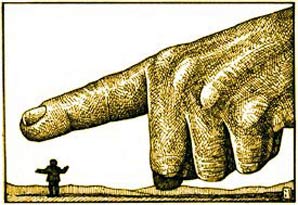
God is not cruel. And He is not responsible for our suffering. Nor is the existentialists’ “fickle finger of fate” or random bad luck. [Existentialists are philosophers who claim that life has no meaning and everything is just an accident]. To be able to love God, we have to have the humility to admit that I have been a bad person, and in fact I am still a bad person. The devotee’s attitude is that due to my past sinful actions I deserve to suffer far more than I am presently suffering, and that God is so kind that He has greatly minimized the suffering that I actually deserve. And for a devotee of God, this is a fact. If there are no consequences for our actions, then we will never learn. In the Bhagavad-gita the Supreme Lord Himself states clearly that it is the living entities themselves who are responsible for the reactions to their activities:
Nor does the Supreme Spirit assume (take responsibility for) anyone’s sinful or pious activities. Embodied beings, however, are bewildered because of the ignorance which covers their real knowledge.
[Bhagavad gita 5:15]
Srila Bhaktivedanta Swami, in the purport to this verse, explains:
… He (the Supreme Lord) does not create a particular situation for any living entity, but the living entity, bewildered by ignorance, desires to be put into certain conditions of life, and thereby his chain of action and reaction begins … Because he is a living soul, he has the capacity to desire by his free will. Such desire is fulfilled only by the omnipotent Lord. And so, when the living entity is bewildered in his desires, the Lord allows him to fulfil those desires, but the Lord is never responsible for the actions and reactions of the particular situation which may be desired …

The Lord is the constant companion of the living entity as Paramatma, or the Supersoul, and therefore He can understand the desires of the individual soul, as one can smell the flavour of a flower by being near it. Desire is a subtle form of conditioning of the living entity. The Lord fulfils his desire as he deserves: Man proposes and God disposes. The individual is not, therefore, omnipotent in fulfilling his desires. The Lord, however, can fulfil all desires, and the Lord, being neutral to everyone, does not interfere with the desires of the minute independent living entities. However, when one desires Krishna the Lord takes special care and encourages one to desire in such a way that one can attain to Him and be eternally happy.
[Purport to Bhagavad-gita 5:15]
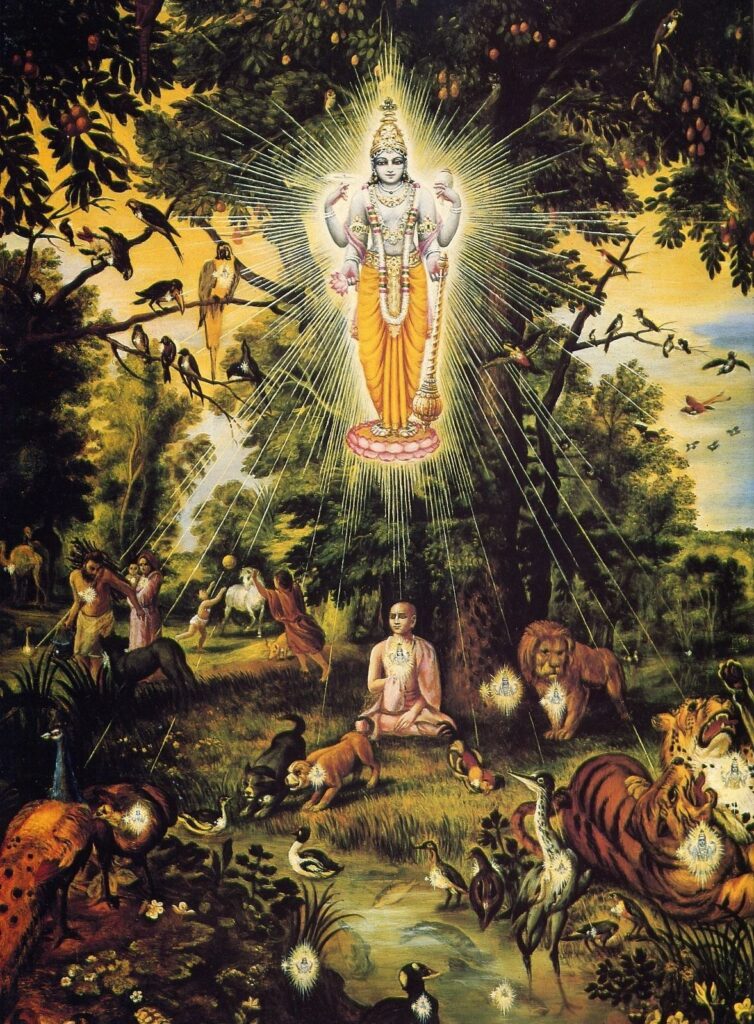
The wonderful thing is that we can change our destiny by engaging in transcendental activities. Actions done for the pleasure of God not only do not create karma, but they also purify us of the karma we have already created. This is especially true of chanting God’s names. The sacred names of the Supreme are the most effective way to purify our hearts and minds and free us from our karma. For instance, a person who is chanting may have been meant to lose an arm due to his karma, but instead he may get a small cut on his arm – his karma is greatly minimized. Srila Bhaktivedanta Swami explains:
Whenever a devotee is in distress or has fallen into difficulty, he thinks that it is the Lord’s mercy upon him. He thinks, ‘Thanks to my past misdeeds I should suffer far, far greater than I am suffering now. So it is by the mercy of the Supreme Lord that I am not getting all the punishment I am due. I am just getting a little, by the mercy of the Supreme Personality of Godhead.’ Therefore he is always calm, quiet and patient, despite many distressful conditions.
[Purport to Bhagavad-gita12:13-14]
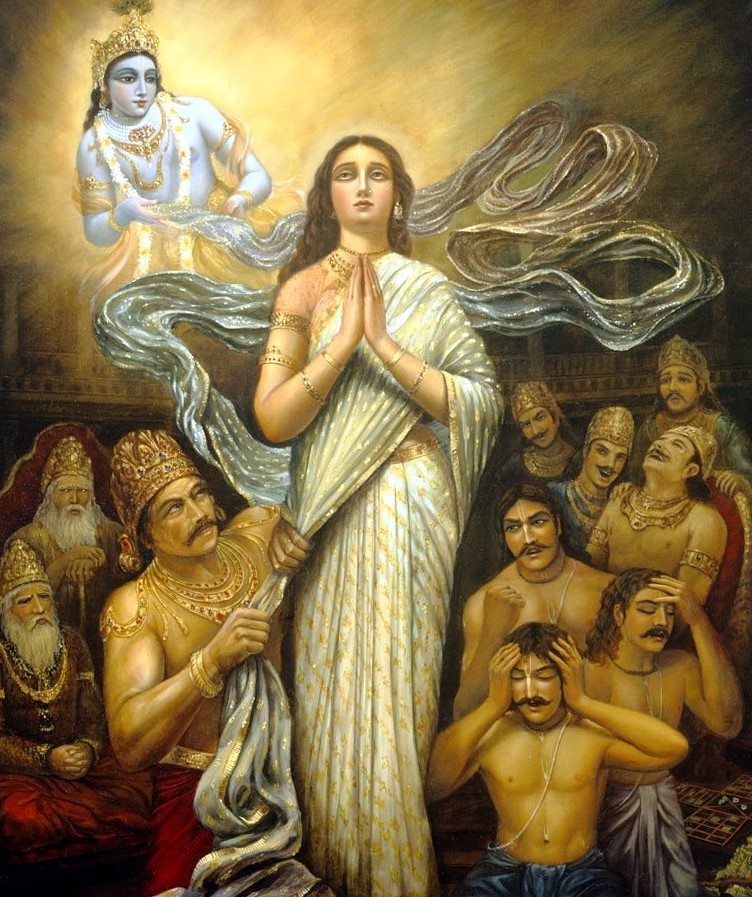
For a devotee, the Supreme Lord arranges his life in such a way so that even when he experiences some karma, it is beneficial for him. He learns valuable lessons to help understand that the material world is a place of misery and not our real home. And he experiences the futility of searching for material happiness. And if we are working for the pleasure of the Lord, rather than working fruitively – to enjoy the results of our actions – then we are not bound by karma for those actions. A pure devotee, for example, is not forced to leave his body at a particular time. He has complete mystic powers and if he desires to stay within his body he can. Bilvamangala Thakur lived in Vrindavan for 700 years.
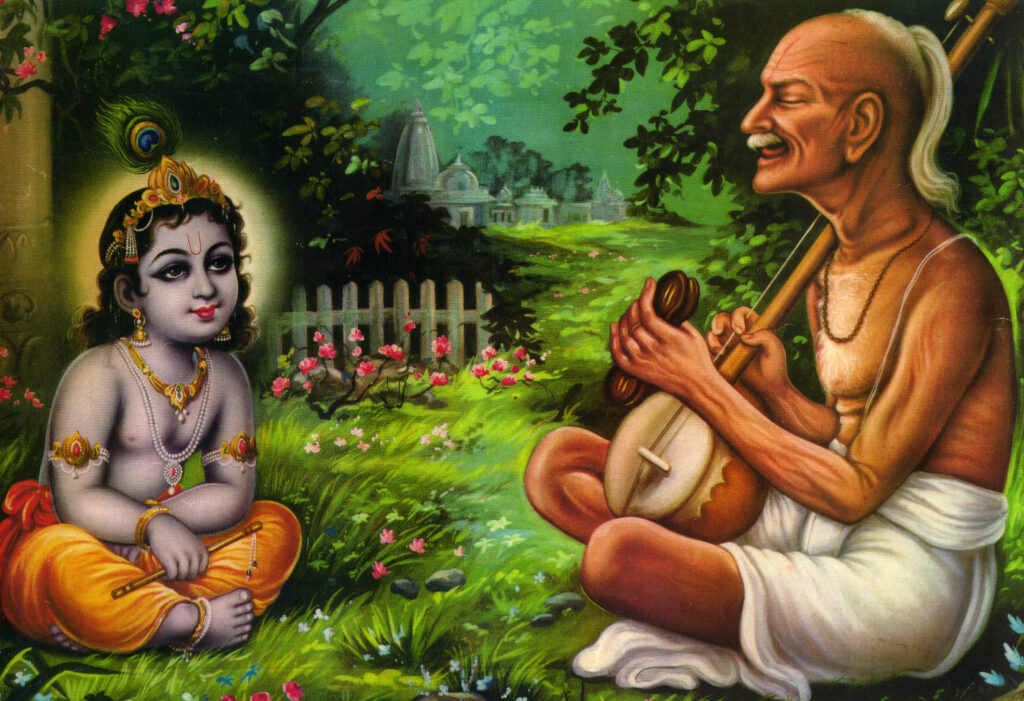
One may aspire to live for hundreds of years if he continuously goes on working in that way, for that sort of work will not bind him to the law of karma. There is no alternative to this way for man.
[Sri Isopanisad mantra 2]
As the blazing fire turns firewood to ashes, O Arjuna, so does the fire of knowledge burn to ashes all reactions to material activities.
[Bhagavad-gita 4:37]
The Personality of Godhead, who appears in the mind of the devotee by attentive devotion and meditation and by chanting of the holy name, releases the devotee from the bondage of fruitive activities [karma] at the time of his quitting the material body.
[Srimad Bhagavatam 1:9:23]
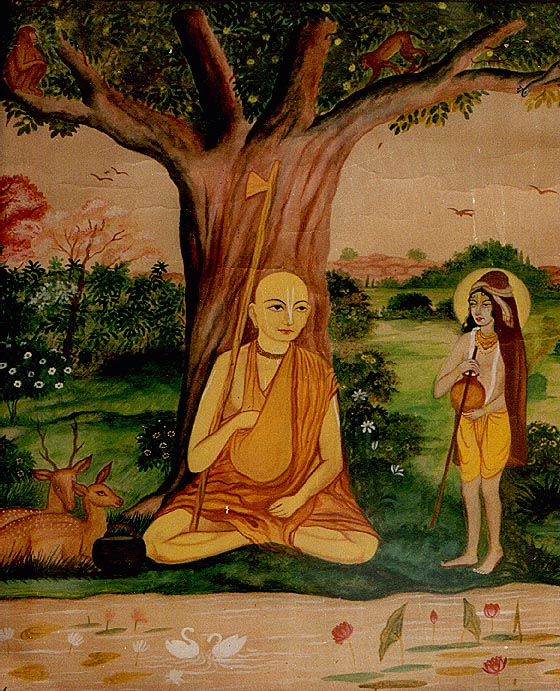
Krishna Visiting Madhavendra Puri
By following the bhakti yoga process, we can be completely purified of all karma and return to the spiritual world. The most powerful method of purification is the chanting of the Lord’s holy names:
Simply by chanting one holy name of Hari, a sinful man can counteract the reactions to more sins than he is able to commit.
[Brhad-Vishnu Purana]
If one chants the holy name of the Lord, even in a helpless condition or without desiring to do so, all the reactions of his sinful life depart, just as when a lion roars, all the small animals flee in fear.
[Garuda Purana]
As a fire burns dry grass to ashes, so the holy name of the Lord, whether chanted knowingly or unknowingly, burns to ashes, without fail, all the reactions to one’s sinful activities.
[Srimad Bhagavatam 6:2:18]
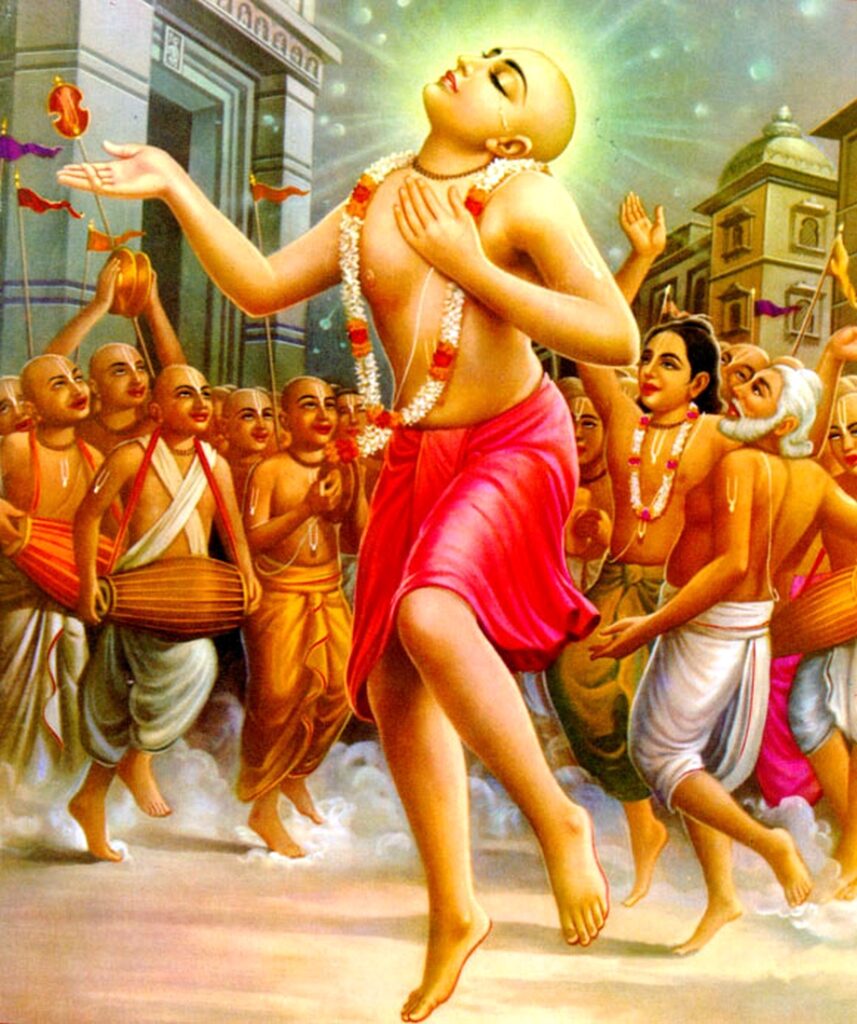
A person engaged in the bhakti yoga process can get free from the cycle of birth and death completely by taking shelter of the Supreme Lord during his life and at the time of death. This means that he or she will be eternally free from karma. This is truly changing our destiny. As there is no difference between the Supreme Lord and His Holy Names, by taking shelter of these mantras at death we obtain the shelter and protection the Lord, and can thus attain Him.
These mantras actually protect and embrace us like the loving arms of God. This is stated in many places throughout the Vedic scriptures. It is made very clear in all of the world’s major scriptures and spiritual traditions that the names of the Lord have the power to change our hearts from being lovers of matter to being lovers of spirit. Most certainly, they can offer us liberation from the suffering of the material world, and propel us into the spiritual dimension. The Vedic scriptures especially put emphasis on the potency of this chanting process as a means to transfer the soul from the material world to the spiritual world at the time of death. In the Bhagavad-gita, the Supreme Lord states:
And whoever, at the time of death, quits his body remembering Me alone, at once attains My nature. Of this there is no doubt.
[Bhagavad-gita 8:5]
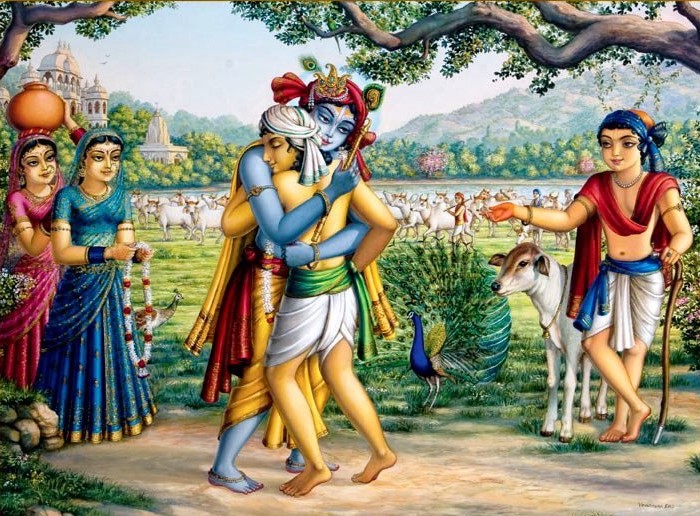
Simply by remembering the Supreme Soul at the time of death, we can attain His spiritual kingdom. And the Srimad Bhagavatam describes the easiest and most effective way to attain this remembrance as being through the hearing and chanting of the Lord’s Holy Names:
Living beings who are entangled in the complicated meshes of birth and death can be freed immediately by even unconsciously chanting the name of Krishna, which is feared by fear personified.
[Srimad Bhagavatam 1:1:14]
Let me take shelter of the lotus feet of Him whose incarnations, qualities and activities are mysterious imitations of worldly affairs. One who invokes His transcendental names, even unconsciously, at the time he quits this life, is certainly washed immediately of the sins of many, many births and attains Him without fail.
[Srimad Bhagavatam 3:9:15]
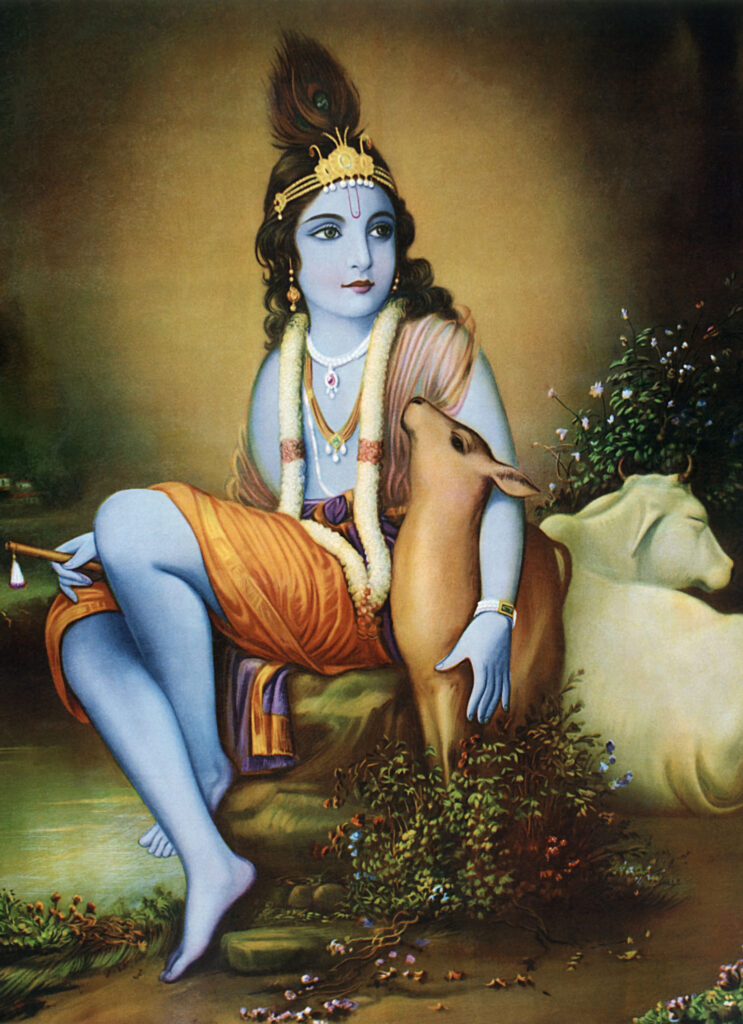


Leave A Reply